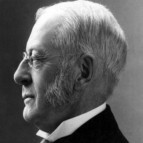
After graduating from Harvard University in 1853, Charles William Eliot (1834–1926) remained at the university as a tutor and then as an assistant professor of mathematics and chemistry until 1863. Leaving to study educational systems in Europe for two years, he returned to Boston in 1865 as professor in analytical chemistry at the newly-formed Massachusetts Institute of Technology. In 1869, he published two articles in the Atlantic Monthly that expressed his vision for American higher education reform and, partially as a result, was soon elected president of Harvard University at age 35. During his 40-year tenure, the school underwent many significant reforms, including curriculum enrichment through the addition of new courses and faculty and the introduction of required written examinations. After resigning from the presidency in 1909, he went on to serve as a member of the General Education Board and the Carnegie Foundation for the Advancement of Teaching.
